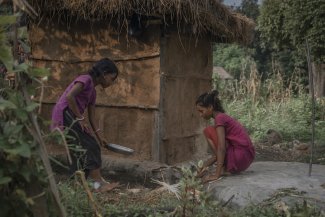Since the Covid-19 outbreak, many ASHA workers across India have unionised and staged protests to demand better working conditions. In this photograph, taken on 26 October 2021, ASHA workers are protesting in the Indian city of Kolhapur in Maharashtra state, demanding an increase in pay, better working conditions, and the status of full-time workers.
It took 49-year-old community healthcare worker Netradipa Patil two years to realise that she had stopped pursuing her hobby. Despite being surrounded by several psychology and mental health books, she hadn’t read them.
“My day would start with household chores, followed by stepping out in the scorching heat to survey my community and help people access public healthcare,” she tells Equal Times. Patil is an accredited social health activist (ASHA), one of the one million, mostly female community healthcare workers employed under India’s National Rural Health Mission to make public healthcare accessible to people in India’s rural villages. She would spend over six hours on foot walking from client to client, only to return home completely drained. ASHAs are typically overburdened with more than 70 healthcare tasks like providing medicines for common ailments, providing ante-and-post natal care, and ensuring the timely immunisation of infants and children.
Regardless of feeling tired, she says she found it difficult to fall asleep. Patil was undergoing the menopause, where women – usually over the age of 40 – see an end to their periods due to lower levels of the hormones estrogen and progesterone. Symptoms can vary from vaginal dryness to mood swings, hot flushes, brain fog, reduced libido and more. “The night sweats would wake me almost daily,” she recalls. With a disturbed schedule, followed by another tiring day at work, her health began deteriorating. I knew going through menopause wouldn’t be easy, but this wasn’t normal either,” she says.
“I never felt so stressed and anxious. I felt like giving up and running away,” remembers Patil, who started experiencing the menopause in early 2020.
Patil, a resident of Kolhapur district in India’s Maharashtra state, kept at it, but when she first experienced hot flashes while surveying her community, she couldn’t understand what was happening. While hot flashes are experienced by more than 80 per cent of women during menopause, what many women – like Patil – all over the world are experiencing are aggravated symptoms, which they attribute to the changes in climatic patterns.
While scant research has been carried out on how climate change impacts the menopause, a paper published in late 2023 by researchers from the University of Pavia in Italy mentioned: “The increase in average and extreme temperatures may modulate the manifestation of vasomotor symptoms (VMS); in particular, environmental temperature and seasonality may affect hot flushes and night sweats.”
By 2025, over a billion women will have experienced the menopause, and their individual experiences are often ignored or sidelined. Given how underresearched menopause is, we are yet to see what impact rising global temperatures will have on women, particularly for the 47 per cent of women participating in the global labourforce. But limited research and anecdotal feedback suggests that “pollution and menopause may contribute to specific women’s health vulnerabilities” such as cardiovascular and metabolic conditions.
Employers “slow to recognise menopause as an issue”
After working throughout the 2019 floods and helping thousands of people to continue to access healthcare, Patil realised her life wasn’t the same anymore. “I used to be bursting with happiness,” she shares. “That changed quite rapidly.” She would quickly get agitated. Meanwhile, during the end of 2020, her health deteriorated to the point where she was hospitalised for a week with a viral infection.
She tried sharing her problems with her supervisors, but they ignored her. “We feel helpless and keep thinking that no one understands our problems, which stresses us further,” shares Patil.
The problems faced by menopausal women in the workplace or even at their homes aren’t restricted to India. Rhianydd Williams, equality and policy officer at the Welsh Trades Union Congress (TUC) in the United Kingdom tells Equal Times:
“Employers, even in workplaces dominated by women workers, have been slow to recognise menopause as an issue, and those going through the menopause might need additional consideration or adjustments. In many cases, menopause is still not recognised as a workplace issue by managers.”
So severe is the problem that Williams adds that many who are going through perimenopause or menopause feel they have to hide their symptoms or only talk about them in a humorous way. “This means many are unable to access the adjustments they need. In some cases, women report feeling forced to leave the workforce altogether due to a lack of support.”
Patil says that many of India’s one million-plus ASHA workers, operate in stifling weather conditions as a lot of their work takes place outside. “While there are guidelines to keep people safe during a heatwave, there’s no help for ASHAs,” says Patil. “We have to keep working, no matter the disaster, and most of the time, we aren’t even paid for it.”
Dealing with climatic changes and systemic issues
ASHA worker Smita Kamble, also from Maharashtra, began experiencing menopausal symptoms this year at the age of 36. “My periods became irregular with excessive bleeding,” she shares. “Sometimes, for seven months, I didn’t get my period.”
Kamble ignored it until she collapsed while surveying her community. “The doctor concluded it was premature menopause, and mounting stress could be one of the reasons that led to it,” she says.
After doing some research she learnt that irregular meal timings, followed by tremendous back-breaking work in the scorching heat and recurring stress caused by the climatic disasters, worsened her symptoms.
Most women experience menopause between the ages of 45 and 55. In the long term, premature menopause can lead to dementia, cognitive impairment, osteoporosis, early mortality, mood disorders, coronary heart disease, and cardiovascular mortality.
Kamble says she has neither the time nor the money to seek help for the symptoms that she is experiencing.
She has been at the forefront of making healthcare accessible in the face of climatic disasters, where she worked almost 12-14 hours daily during the recurring floods, which even destroyed her house.
Eventually, the stress started to take a toll. According to a November 2023 study published by Menopause: the Journal of Menopause Society, stress is directly linked with menopausal symptoms. It also found that “previously diagnosed depression or anxiety disorder were related to the intensity of menopausal symptoms.”
Kamble tells Equal Times: “I was so stressed that often my head would ache beyond what I could bear.” She didn’t get any time off on the hottest days of the year, which further deteriorated her health. “The only option for several women like me is to deal with the pain and wait till it goes away,” she shares. However, the problem doesn’t end here. A 2023 study published in The Lancet found that higher levels of air pollutants are associated with bone damage in postmenopausal women. It found exposure to nitrogen oxides as a leading contributor to bone loss in postmenopausal women.
Several trade unions around the world, including Wales TUC, have developed a toolkit on building menopause-friendly workplaces. Talking about solutions for menopausal outdoor workers, Williams suggests: “Improving the welfare facilities by providing cold water, shading, sunscreen, cool rooms as needed, weather-related contract terms, changes in the shift patterns to avoid heat extremes.”
Confronting menopause stigma
When ASHA Netradipa Patil experienced menopause, she found it difficult to talk to anyone about it. This was not because she was hesitant, but “talking about it is considered a taboo,” she says. Whenever she got anxious or irritated, her worries were dismissed as ‘overthinking’.
“There are no counseling facilities for menopausal healthcare workers,” says Patil. “The only thing we are told is to take rest and medicines. As if only doing that will solve the problem,” she says dryly. Moreover, Patil found that she knew nothing about menopause, which was also true of many of her colleagues.
M. Sivakami, a professor at the School of Health Systems Studies at Tata Institute of Social Sciences, Mumbai, tells Equal Times:
“A lot of the stress that women go through stems from the stigma associated with menstruation. Because of this, a significant proportion of women who experience drastic or heavy bleeding cannot talk to the men in the family.”
“As in Indian society, many of the men are decision-makers. As a result, many women cannot seek treatment for their menopausal symptoms.”
Patil, a union leader with ASHA and Gatpravartak Karamchari Sanghatana (ASHA Workers’ and Supervisors’ Union, in English) also found this during her fieldwork. So, she decided to help other ASHAs by normalising conversations around the menopause. First, she began reading more about menopause before reaching out to various doctors for solutions. Some told her to drink cold water or use a fan. “I started sharing these tips with the community women and fellow ASHAs,” she shares. Soon, she began posting information on WhatsApp, which was also seen by several men. “My goal was not just to educate women, but even involve men because menopause is not just a woman’s issue,” she shares.
Patil has been talking to several ASHAs and making them aware of the menopause and how to manage its symptoms. “It’s still a long way before the menopause is a part of everyday conversation. But now, when we talk about menopause, we are seeing more women taking an interest in sharing their experiences, which is a big success.”













